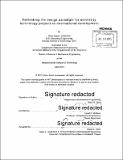Rethinking the design paradigm for university technology projects in international development
Author(s)
Lesniewski, Victor Adam
DownloadFull printable version (5.823Mb)
Other Contributors
Massachusetts Institute of Technology. Department of Mechanical Engineering.
Advisor
David R. Wallace.
Terms of use
Metadata
Show full item recordAbstract
Since the appropriate technology movement of the 1970s, technology and engineering from developed countries have played a role in international development. In recent years, universities have created graduate-level programs that look to engage students to solve challenges faced by resource-constrained communities globally by leveraging technology and innovation. These projects must balance the need for graduate students to produce scholarly research and the objective of creating impactful interventions for the world's poor and marginalized population. Furthermore, these projects must be conducted responsibly, remotely, and in fulfillment of project sponsors. This thesis explores two projects to better understand such engineering for development initiatives. The first project is a technology evaluation project that aimed to design and employ methodologies to determine which products in the "developing world" worked best. Specifically, the project's first evaluation on solar lanterns used in Uganda is described. The second project is a technology development project that sought to develop a scalable electricity grid technology platform to provide universal electricity access in India. The two projects are documented as case studies and conceptualized as design processes, specifically product development processes. Through the lens of the structured product development process, selected aspects of the cases are further explained and secondary literature serves as a basis for suggesting alternative design decisions and actions. Although the successes and failures of the two cases are not assessed in this work, the analysis suggests that technology-focused graduate-level projects in international development may explore alternative approaches that more carefully consider (1) early-stage planning, (2) contextualization of the technology focus, (3) project timescales, and (4) the intent of community engagement. Further work is needed to document and analyze the processes of other projects in this space and to understand how they vary. The product development process may be a useful tool in understanding how these projects might systematically achieve both scholarly and international development impact through the use of design and engineering.
Description
Thesis: S.M., Massachusetts Institute of Technology, Department of Mechanical Engineering, 2015. Cataloged from PDF version of thesis. Includes bibliographical references (pages 65-67).
Date issued
2015Department
Massachusetts Institute of Technology. Department of Mechanical EngineeringPublisher
Massachusetts Institute of Technology
Keywords
Mechanical Engineering.